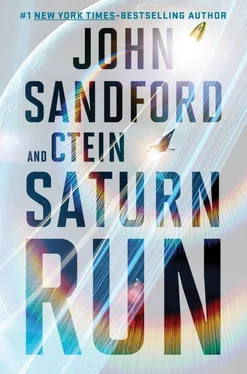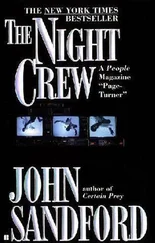The answer-bot continued. “Physical art artifacts are valued by species with similar sensory systems and possessed of an inclination toward acquisitiveness. These are worth something. Comestibles can also be rated highly, especially those that cannot be duplicated based on the transmission of data.”
Stuyvesant jumped on that—her specialty, biology. “Oh, come on. You’re telling me different species from entirely different ecosystems can eat each other’s food?”
“Very rarely. On the infrequent occasions when the biologicals are compatible, though, those can be highly prized trade goods.”
Clover said, “Makes sense to me. How much were rich folks in Europe willing to pay for spices a few hundred years ago? Stuff we take for granted, like peppercorns. A king’s ransom. And that’s not an exaggeration.”
Stuyvesant pondered for a moment. “Hmmm, there’s the commander’s tea—you can’t transmit ‘specs’ for that. And I’ve heard rumors there’s some pretty good booze squirreled away somewhere.”
Clover winced. “I’ll work on a list.”
Barnes got back to the jukebox: “Is there any limit on the number of trades?”
“Not exactly. Trade items are evaluated by a trade computer and assigned a total numerical value between 1 and 8. You may leave the items and choose trade items with a similar total value.”
“Was that top number chosen because your makers use a mathematical system with a base eight?” Stuyvesant asked.
“I have no information about my makers.”
“Is your native mathematical system in base 8?”
“Yes, except for our mathematical computer languages. However, when speaking with you, I convert all numbers to base 10.”
Stuyvesant: “When you have new arrivals, does the station provide them with a relevant environment, as you did with us?”
“Yes, if it is within the station’s means. Not all species can be accommodated. Those that cannot be accommodated always have means to maneuver in space, so they do that.”
“Do all species require gaseous environments?”
“No. Some require hybrid gas-liquid environments.”
Clover: “Does the size of your entry air lock and entry hall suggest that other species may be quite large?”
“Yes.”
“This was supposed to be my two minutes, goddamnit,” Fiorella said. To the jukebox: “Wurly, do you have a message for the people of Earth?”
“Yes.”
“What is it?”
Wurly said, “Hello, people of Earth.”
Fiorella: “Anything more?”
“No.”
Barnes muttered, “Well, shit, that was inspiring. I’m calling an end to this… again. Everybody ready? Let’s go.”
Leaving was as simple as the arrival. From the bus, Sandy fired the contents of his camera’s memory back to the Nixon . It was gone in a few seconds; they were gone in another minute.
Back at the Nixon , the contact team stepped through the air lock and found themselves face-to-face with a room full of people, easily half the ship’s complement, clapping, cheering. Fang-Castro was leading the cheer and even Crow was smiling.
The commander stepped forward. “Congratulations to you all. You just made history.” She turned to Sandy. “Mr. Darlington, job well done. The recordings and data you beamed back are already on their way to Earth.”
To the rest of them, she said, “I’ll give you a half hour to decompress, and use the facilities, but then I need you all in the Commons to discuss what you learned. Captain Barnes, you’re headed for isolation, but we’ve got vid and sound ready for you. We are indebted to you for your courage in making yourself a guinea pig: I will recommend to the commandant of the Marine Corps that you be awarded the Bronze Star. I believe you deserve better than that, but nobody has yet defined our aliens as an enemy force. In any case, I’m sure we are all inspired by your selfless act.”
Another round of applause, and seven of them began peeling off EVA suits while Barnes clumped away to the isolation suite.
The Commons was jammed: the entire first contact team was there, with all the department heads, and all the individual scientists, no matter the discipline. Sandy set up his cameras, set to record and transmit, and Barnes, relaxing in the isolation suite, gave a brief summary, and then said, “I think you’ve all seen Sandy’s movie by now, so you really know as much as we do. The question isn’t what we got, the question is, what does it mean? That’s more in your territory than mine.”
Crow jumped in immediately, addressing himself to Fang-Castro: “Ma’am, one thing is already crystal-clear from the vid. If the jukebox, uh, Wurly, is not lying to us, then everything we hoped for and feared is about to happen. The aliens are about to deliver technology that could unbalance the world’s power structure. In my opinion, that’s the number one thing that our strategists on Earth have to think about. The other stuff is interesting, or, I should say, fascinating, but the tech… that’s beyond important.”
Barnes got back in: “I’m a little skeptical. Total strangers, ‘benevolent’ aliens give us incredibly valuable and very dangerous tech? They’re handing the family jewels to someone who could potentially be their enemy. What’s the catch?”
Fang-Castro nodded, looked at Clover: “John?”
Clover took the cue. “Y’know what I think? I think they’re pump-priming. I think they’re giving us technology that they expect will make us more valuable to them. I don’t think this is charity or altruism. I think this is self-interest. Remember, they already have met us, in a very real sense. They know our languages. We don’t know how they know—maybe their supercomputers just analyzed radio broadcasts. But however they got their hands on the information, they know a lot more about us than we know about them. Besides, it’s not like this costs them anything.”
Crow cleared his throat. “I’m in agreement with John on this one. There’s nothing the aliens could give us that would make us a credible threat to them. We don’t know who they are, or where they’re from. One thing we do know is that they could be an existential danger to us, if we tried to mess with them. So there’s no downside for them in giving us this stuff, and there might be a considerable upside.”
Sandy interjected, “You don’t think antimatter technology makes us a lot more dangerous?”
“To ourselves, maybe, but not to them,” Crow said. “Try this thought on for size. Suppose the U.S. were to give Jamaica, with whom we’re none too friendly these days, all our military designs and knowledge. What could they do with it? Attack us? Sure, they might get in one slap. Then we’d wipe their island off the face of the planet. At the first White House briefing on the starship’s arrival, the military science guys told President Santeros that one of the reasons we had to come out here was because a starship was inherently very dangerous. Slam one into the earth at running speed and there’s a good chance you make humanity extinct, or at least push it back to the Stone Age.”
Martinez joined in. “That’s just the technology we know about. All we’ve seen is a starship that is a century or so ahead of our engineering. From what we’ve seen here and been told by the answer-bot, we know it’s not their first or only one. A ship like the one we detected may take a century or more to make a trip between star systems. The ’bot said it was installed seventeen centuries ago. How many millennia ago did the makers build their first starship? Three? Four? Ten? And what about the other species, the ones who aren’t the makers? And who built that damn primary thing twenty millennia back?”
Читать дальше








